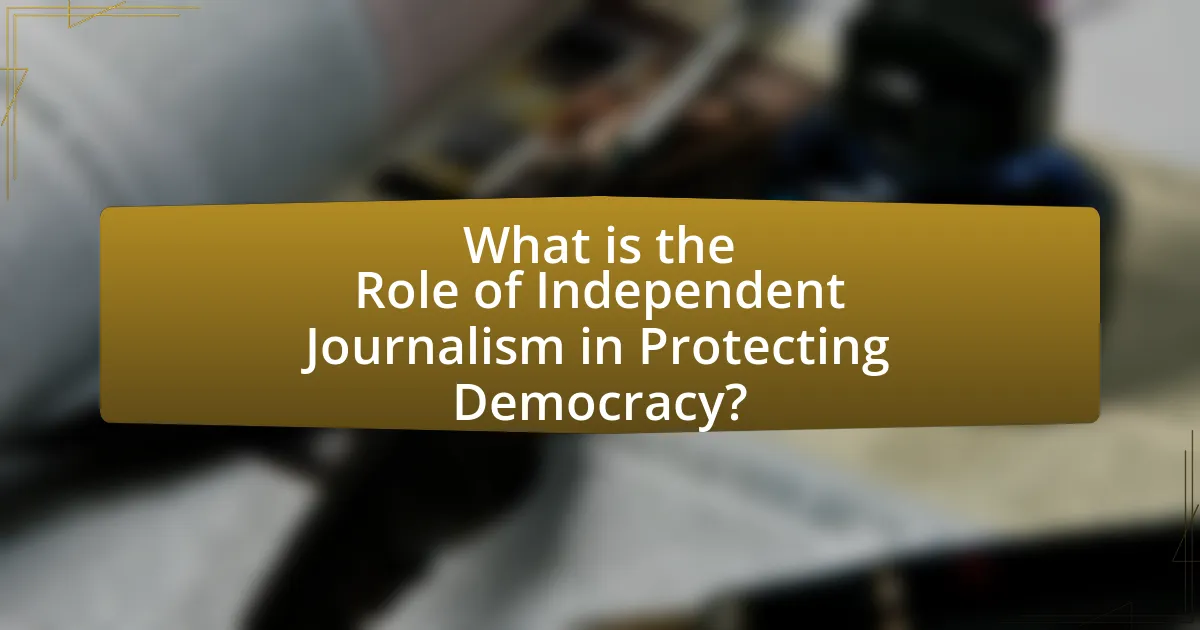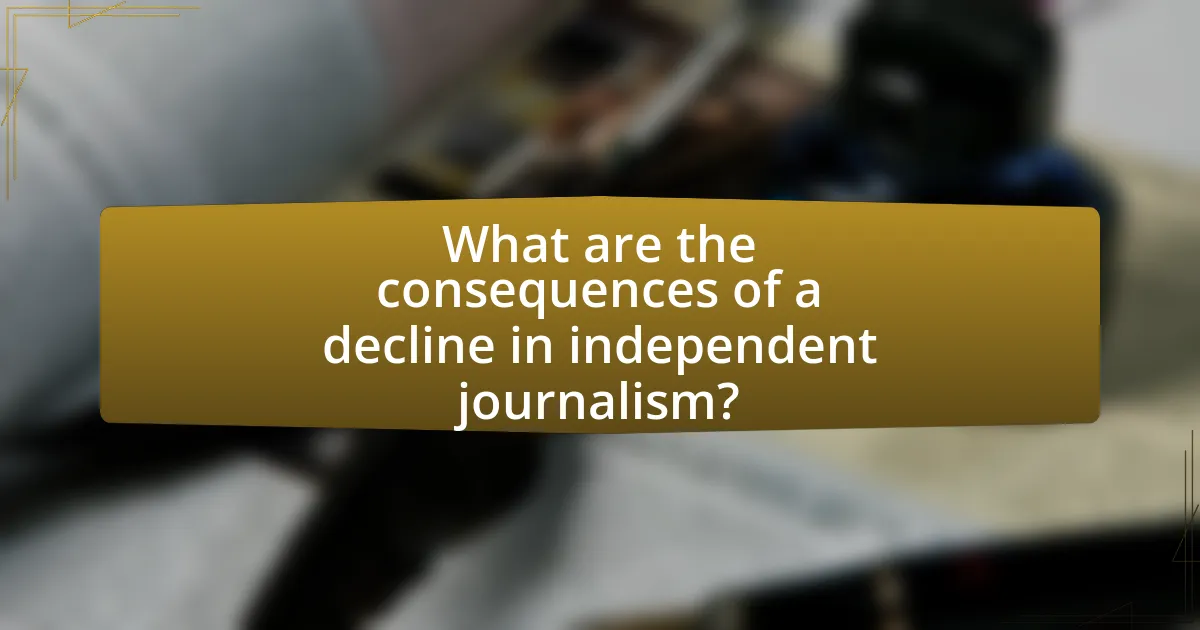Independent journalism is essential for protecting democracy by ensuring transparency, accountability, and an informed citizenry. It serves as a watchdog against abuses of power, fosters public discourse, and enhances civic engagement. The article explores the key functions of independent journalism, including its role in promoting accountability, facilitating access to information, and shaping public opinion. It also addresses the challenges faced by independent journalism, such as financial instability and political pressures, while highlighting the importance of supporting and strengthening independent media to sustain democratic processes. Historical examples illustrate the impact of independent journalism on democratic movements, emphasizing its critical role in maintaining a healthy democracy.

What is the Role of Independent Journalism in Protecting Democracy?
Independent journalism plays a crucial role in protecting democracy by ensuring transparency, accountability, and informed citizenry. It serves as a watchdog against government and corporate abuses of power, providing citizens with the information necessary to make informed decisions. For instance, investigative reporting has historically uncovered corruption and misconduct, such as the Watergate scandal, which led to significant political reforms. Furthermore, independent journalism fosters public discourse by presenting diverse viewpoints, thereby enhancing democratic participation. Studies show that countries with a robust independent press tend to have higher levels of civic engagement and lower levels of corruption, reinforcing the essential function of journalism in a healthy democracy.
How does independent journalism contribute to democratic processes?
Independent journalism contributes to democratic processes by providing unbiased information, fostering public discourse, and holding power accountable. This form of journalism ensures that citizens are informed about government actions and societal issues, which is essential for making educated decisions during elections and civic engagement. For instance, studies have shown that countries with a robust independent press experience higher levels of political participation and lower levels of corruption. According to the World Press Freedom Index, nations with greater press freedom tend to have stronger democratic institutions, highlighting the critical role independent journalism plays in sustaining democracy.
What are the key functions of independent journalism in a democracy?
Independent journalism serves several key functions in a democracy, including providing information, acting as a watchdog, fostering public discourse, and promoting accountability. By delivering accurate and timely news, independent journalism informs citizens about government actions and societal issues, enabling informed decision-making. As a watchdog, independent journalism investigates and exposes corruption, abuse of power, and injustices, thereby safeguarding democratic principles. Furthermore, it fosters public discourse by presenting diverse viewpoints and encouraging debate, which is essential for a healthy democracy. Lastly, independent journalism promotes accountability by holding public officials and institutions responsible for their actions, ensuring transparency in governance. These functions collectively reinforce the democratic process and empower citizens.
How does independent journalism promote accountability in government?
Independent journalism promotes accountability in government by investigating and reporting on government actions, thereby exposing corruption and misconduct. This scrutiny encourages transparency, as officials are aware that their actions are being monitored by the media. For instance, the Watergate scandal, uncovered by journalists Bob Woodward and Carl Bernstein, led to the resignation of President Nixon, demonstrating how investigative reporting can hold powerful figures accountable. Furthermore, independent journalism provides citizens with the information necessary to make informed decisions, fostering civic engagement and enabling the electorate to demand accountability from their representatives.
Why is independent journalism essential for informed citizenry?
Independent journalism is essential for informed citizenry because it provides unbiased information that enables individuals to make educated decisions about their governance and societal issues. This form of journalism acts as a watchdog, holding power to account and ensuring transparency in government actions. For instance, studies have shown that countries with a robust independent press experience higher levels of civic engagement and voter participation, as citizens are better informed about policies and political candidates. Furthermore, independent journalism often uncovers corruption and abuses of power, which are critical for maintaining a healthy democracy.
How does independent journalism facilitate access to information?
Independent journalism facilitates access to information by providing unbiased reporting that is free from corporate or governmental influence. This type of journalism ensures that diverse perspectives are represented, allowing the public to receive a comprehensive understanding of events and issues. For instance, independent media outlets often investigate and report on topics that mainstream media may overlook due to conflicts of interest, thereby enhancing the public’s knowledge base. Research indicates that countries with a strong independent press have higher levels of civic engagement and informed citizenry, which are essential for a functioning democracy.
What impact does independent journalism have on public opinion?
Independent journalism significantly shapes public opinion by providing unbiased information and diverse perspectives. This type of journalism fosters informed citizenry, enabling individuals to make educated decisions about political and social issues. Research indicates that independent media outlets are more likely to investigate and report on corruption and abuses of power, which can lead to increased public awareness and engagement. For instance, a study by the Pew Research Center found that audiences who consume independent news are more likely to express trust in media and feel empowered to participate in democratic processes. Thus, independent journalism plays a crucial role in influencing public perceptions and behaviors, ultimately supporting democratic values.
What challenges does independent journalism face in a democratic society?
Independent journalism faces significant challenges in a democratic society, primarily including financial instability, political pressure, and misinformation. Financial instability arises from declining advertising revenues and the shift to digital platforms, which often favor larger media conglomerates over independent outlets. Political pressure manifests through government scrutiny, threats, and attempts to influence reporting, undermining journalistic integrity. Misinformation complicates the landscape, as independent journalists struggle to compete with the rapid spread of false narratives on social media, which can erode public trust in credible news sources. These challenges collectively hinder the ability of independent journalism to fulfill its essential role in promoting transparency and accountability in a democracy.
How do political pressures affect independent journalism?
Political pressures significantly undermine independent journalism by limiting its ability to report freely and accurately. When governments or political entities exert influence, journalists may face censorship, threats, or economic repercussions, which can lead to self-censorship or biased reporting. For instance, a study by the Committee to Protect Journalists found that in countries with high political pressure, journalists are more likely to be imprisoned or attacked, which directly impacts their capacity to investigate and report on critical issues. This suppression of independent journalism ultimately weakens democratic processes by restricting the flow of information necessary for informed public discourse.
What role does technology play in the challenges faced by independent journalism?
Technology significantly complicates the challenges faced by independent journalism by enabling the rapid spread of misinformation and creating economic pressures. The rise of social media platforms allows false narratives to gain traction quickly, undermining the credibility of independent news sources. Additionally, the digital advertising model has shifted revenue away from traditional journalism, making it difficult for independent outlets to sustain operations. According to a 2021 report by the Pew Research Center, 71% of Americans believe that social media platforms contribute to the spread of misinformation, highlighting the detrimental impact of technology on journalistic integrity.
How can independent journalism be supported and strengthened?
Independent journalism can be supported and strengthened through increased funding, legal protections, and public engagement. Increased funding can come from diverse sources such as grants, donations, and crowdfunding, which help sustain independent outlets that may struggle against larger media corporations. Legal protections, including shield laws that protect journalists from revealing sources, are essential to ensure that independent journalists can operate without fear of retaliation. Public engagement, through community support and participation in journalism initiatives, fosters a culture that values independent reporting. According to a 2021 report by the Pew Research Center, 71% of Americans believe that independent journalism is crucial for democracy, highlighting the public’s recognition of its importance and the need for collective efforts to support it.
What initiatives can promote the sustainability of independent journalism?
Initiatives that can promote the sustainability of independent journalism include establishing nonprofit news organizations, implementing subscription models, and fostering community-supported journalism. Nonprofit news organizations, such as ProPublica, demonstrate that funding through donations and grants can sustain investigative journalism without reliance on advertising revenue. Subscription models, like those used by The New York Times, show that readers are willing to pay for quality journalism, providing a steady income stream. Community-supported journalism, exemplified by local news cooperatives, engages the audience directly, ensuring that reporting reflects community needs while securing financial backing from local residents. These initiatives collectively enhance the viability of independent journalism, ensuring its critical role in democracy.
How can citizens contribute to the protection of independent journalism?
Citizens can contribute to the protection of independent journalism by actively supporting and engaging with credible news sources. This support can manifest through financial contributions, such as subscriptions or donations to independent media outlets, which helps sustain their operations and journalistic integrity. According to a 2021 report by the Pew Research Center, 70% of Americans believe that independent journalism is essential for democracy, highlighting the public’s recognition of its value. Additionally, citizens can advocate for press freedom by participating in campaigns that promote the protection of journalists and opposing legislation that threatens media independence. Engaging in discussions about the importance of independent journalism on social media platforms also raises awareness and encourages others to value and support these essential services.

What are the consequences of a decline in independent journalism?
The decline in independent journalism leads to a significant erosion of democratic accountability. Without independent journalists, there is a reduced capacity to investigate and report on government actions, corporate malfeasance, and social injustices, which undermines the public’s ability to make informed decisions. Research from the Pew Research Center indicates that communities with fewer independent news sources experience a decline in civic engagement and voter participation, as citizens lack access to critical information. Furthermore, the absence of independent journalism can result in the proliferation of misinformation, as unverified narratives fill the void left by credible reporting, further destabilizing democratic processes.
How does a lack of independent journalism affect democracy?
A lack of independent journalism undermines democracy by limiting the public’s access to accurate information and reducing accountability for those in power. Without independent reporting, citizens cannot make informed decisions, leading to a weakened electoral process and increased susceptibility to misinformation. Historical examples, such as the decline of press freedom in authoritarian regimes, demonstrate that when independent journalism is suppressed, corruption and abuse of power often flourish, eroding democratic institutions. Studies show that countries with robust independent media tend to have higher levels of civic engagement and lower levels of corruption, reinforcing the critical role that independent journalism plays in sustaining a healthy democracy.
What are the risks of misinformation in the absence of independent journalism?
The risks of misinformation in the absence of independent journalism include the spread of false narratives, erosion of public trust, and manipulation of public opinion. Without independent journalism, there is a lack of fact-checking and accountability, which allows misleading information to proliferate unchecked. For instance, studies have shown that misinformation can lead to significant public health risks, as seen during the COVID-19 pandemic, where false information about the virus and vaccines contributed to vaccine hesitancy and unsafe behaviors. Furthermore, the absence of independent journalism can enable authoritarian regimes to control narratives, suppress dissent, and undermine democratic processes, as evidenced by the decline of press freedom in countries like Turkey and Russia, where state-controlled media dominate the information landscape.
How does the decline of independent journalism impact civic engagement?
The decline of independent journalism significantly reduces civic engagement by limiting access to diverse viewpoints and critical information necessary for informed decision-making. When independent media outlets diminish, citizens encounter fewer opportunities to engage with investigative reporting that holds power accountable, which is essential for a functioning democracy. Research indicates that communities with robust independent journalism experience higher levels of voter participation and civic involvement, as these outlets foster public discourse and awareness of local issues. For instance, a study by the Pew Research Center found that local news coverage correlates with increased civic participation, demonstrating that the absence of independent journalism directly undermines the public’s ability to engage meaningfully in democratic processes.
What historical examples illustrate the importance of independent journalism?
Independent journalism has played a crucial role in various historical contexts, notably during the Watergate scandal in the 1970s. Investigative journalists Bob Woodward and Carl Bernstein of The Washington Post uncovered a cover-up involving President Richard Nixon, which ultimately led to his resignation. This example illustrates how independent journalism can hold powerful figures accountable and protect democratic integrity. Another significant instance is the publication of the Pentagon Papers in 1971 by The New York Times, which revealed government deception regarding the Vietnam War. This act of independent journalism informed the public and sparked widespread debate about government transparency and accountability. These examples underscore the essential function of independent journalism in safeguarding democracy by exposing corruption and fostering informed citizenry.
How did independent journalism influence major democratic movements?
Independent journalism significantly influenced major democratic movements by providing unbiased information, fostering public discourse, and holding power accountable. For instance, during the Arab Spring, independent media outlets reported on government abuses and mobilized citizens, which contributed to widespread protests and regime changes in countries like Tunisia and Egypt. Additionally, investigative journalism has exposed corruption and human rights violations, as seen in the Watergate scandal, which led to President Nixon’s resignation and reinforced the importance of a free press in democracy. These examples illustrate how independent journalism serves as a catalyst for democratic change by informing the public and empowering civic engagement.
What lessons can be learned from past challenges faced by independent journalism?
Past challenges faced by independent journalism highlight the importance of resilience, adaptability, and the need for robust support systems. For instance, during the Watergate scandal, investigative journalists demonstrated that thorough reporting can hold powerful entities accountable, reinforcing the role of journalism in democracy. Additionally, the rise of digital platforms has shown that independent journalism must adapt to new technologies and audience behaviors to remain relevant and effective. The decline in advertising revenue for traditional media underscores the necessity for diverse funding models, such as nonprofit journalism, to sustain independent reporting. These lessons emphasize that independent journalism must evolve continuously to confront threats and maintain its critical function in a democratic society.

What future trends may impact independent journalism and democracy?
Future trends that may impact independent journalism and democracy include the rise of artificial intelligence, the increasing prevalence of misinformation, and the consolidation of media ownership. Artificial intelligence can enhance news production and distribution but may also lead to biased reporting if algorithms are not transparent. The spread of misinformation undermines public trust in media, making it challenging for independent journalism to maintain credibility. Additionally, the consolidation of media ownership limits diverse viewpoints, which is essential for a healthy democracy, as evidenced by the decline in local news outlets and the concentration of media power in a few corporations. These trends collectively threaten the integrity and sustainability of independent journalism, which is vital for democratic accountability.
How is the digital landscape changing independent journalism?
The digital landscape is transforming independent journalism by enhancing accessibility and enabling diverse voices to reach wider audiences. Online platforms allow independent journalists to publish content without traditional gatekeeping, fostering a more democratic information environment. For instance, social media channels and blogs have become vital tools for independent reporters, allowing them to disseminate news rapidly and engage directly with audiences. According to a 2021 Pew Research Center study, 53% of U.S. adults reported getting news from social media, highlighting the shift in how audiences consume information. This evolution not only increases the visibility of independent journalism but also challenges established media outlets to adapt to new forms of competition and audience engagement.
What opportunities does digital media present for independent journalism?
Digital media presents significant opportunities for independent journalism by enabling broader reach and engagement with audiences. Independent journalists can utilize platforms like social media, blogs, and podcasts to disseminate information quickly and interactively, bypassing traditional gatekeepers. For instance, a report by the Pew Research Center indicates that 62% of U.S. adults get news from social media, highlighting the potential for independent journalists to connect with diverse audiences. Additionally, digital media allows for lower operational costs, as independent journalists can produce and share content without the need for large newsrooms or extensive resources. This democratization of information fosters a more pluralistic media landscape, essential for a healthy democracy.
How can independent journalism adapt to new technologies?
Independent journalism can adapt to new technologies by leveraging digital platforms for distribution, utilizing data analytics for audience engagement, and employing multimedia storytelling techniques. Digital platforms, such as social media and websites, allow independent journalists to reach wider audiences quickly, as evidenced by the rise of independent news outlets that have gained significant followings online. Data analytics can help journalists understand audience preferences and tailor content accordingly, enhancing engagement; for instance, platforms like Google Analytics provide insights into reader behavior. Additionally, multimedia storytelling, which incorporates video, audio, and interactive elements, can make reporting more compelling and accessible, as seen in successful independent projects that utilize these formats to convey complex issues effectively.
What best practices can enhance the effectiveness of independent journalism?
Best practices that can enhance the effectiveness of independent journalism include maintaining editorial independence, ensuring transparency in funding, and prioritizing fact-checking. Editorial independence allows journalists to report without external pressures, which is crucial for unbiased coverage. Transparency in funding helps build trust with the audience, as it clarifies potential conflicts of interest. Prioritizing fact-checking is essential to uphold credibility, as studies show that misinformation can significantly undermine public trust in media. For instance, a report by the Pew Research Center indicates that 64% of Americans believe that fabricated news stories cause confusion about the basic facts of current events. Implementing these practices can significantly strengthen the role of independent journalism in protecting democracy.
How can independent journalists ensure credibility and trustworthiness?
Independent journalists can ensure credibility and trustworthiness by adhering to rigorous fact-checking protocols and maintaining transparency in their reporting processes. By verifying information through multiple reliable sources before publication, journalists can substantiate their claims and reduce the risk of disseminating false information. For instance, a study by the Pew Research Center found that 62% of Americans believe that fact-checking enhances the credibility of news sources. Additionally, independent journalists should disclose their sources and any potential conflicts of interest, which fosters trust with their audience. This practice aligns with ethical journalism standards set by organizations like the Society of Professional Journalists, which emphasizes the importance of accountability and transparency in reporting.
What strategies can independent journalism employ to engage diverse audiences?
Independent journalism can engage diverse audiences by employing strategies such as community-focused reporting, multilingual content creation, and leveraging social media platforms. Community-focused reporting involves journalists actively participating in local events and issues, which fosters trust and relevance among different demographic groups. For instance, a study by the American Press Institute found that local news organizations that prioritize community engagement see increased audience loyalty and participation.
Multilingual content creation allows independent journalism to reach non-English speaking populations, ensuring that critical information is accessible to all. According to the U.S. Census Bureau, over 21% of the U.S. population speaks a language other than English at home, highlighting the necessity for diverse language offerings in journalism.
Leveraging social media platforms enables independent journalists to connect with younger audiences who primarily consume news online. Research from the Pew Research Center indicates that 53% of U.S. adults often get news from social media, making it a vital channel for reaching diverse groups. By utilizing these strategies, independent journalism can effectively engage a broader audience and enhance its role in protecting democracy.
What actions can individuals take to support independent journalism?
Individuals can support independent journalism by subscribing to and donating to independent news outlets. Financial contributions enable these organizations to operate without reliance on corporate or governmental funding, which can compromise journalistic integrity. For instance, a study by the Pew Research Center found that 70% of Americans believe that independent journalism is crucial for democracy, highlighting the importance of financial support. Additionally, individuals can share articles from independent journalists on social media platforms, increasing their visibility and reach. Engaging in discussions about the importance of independent journalism within communities also fosters a culture that values diverse perspectives and accountability in reporting.
How can readers identify and support credible independent news sources?
Readers can identify and support credible independent news sources by evaluating their transparency, funding sources, and adherence to journalistic standards. Credible independent news outlets often disclose their funding and ownership structures, allowing readers to assess potential biases. For instance, organizations like ProPublica and The Center for Investigative Reporting are known for their commitment to transparency and public interest journalism. Additionally, readers should look for news sources that follow ethical guidelines, such as those outlined by the Society of Professional Journalists, which emphasize accuracy, fairness, and accountability. Supporting these outlets through subscriptions or donations can help sustain their operations and promote independent journalism, which is essential for a healthy democracy.
What role do subscriptions and donations play in sustaining independent journalism?
Subscriptions and donations are crucial for sustaining independent journalism by providing financial resources that enable media outlets to operate without reliance on corporate or governmental funding. This financial independence allows journalists to pursue investigative reporting and cover stories that may challenge powerful interests. For instance, a study by the Pew Research Center found that 70% of Americans believe that independent journalism is essential for democracy, highlighting the public’s recognition of its importance. Furthermore, outlets like The Guardian and ProPublica have successfully utilized subscription models and donations to fund their operations, demonstrating that this approach can effectively support quality journalism while maintaining editorial independence.

Leave a Reply